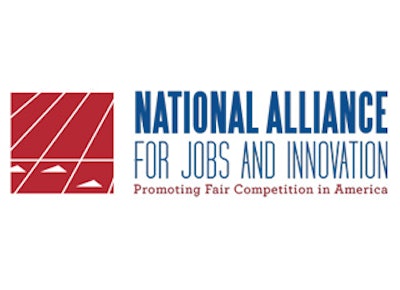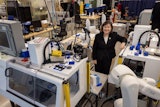
Last week, the National Alliance for Jobs and Innovation (NAJI) announced the start of its battle against the rampant theft of intellectual property (IP) and information technology (IT) around the world. The non-partisan organization, which includes high-profile members like the National Association of Manufacturers and Microsoft, along with more than 100 others, aims to educate the U.S. public about the sheer volume of IP theft and piracy, and the cumulative effect it has on the nation’s economy. From there, NAJI hopes to influence the federal government into formulating new policies that will help reduce piracy and IP theft, which would, in turn, normalize competitiveness between American manufacturers and those in countries like China and India.
NAJI has the numbers on their side — IP and IT developments are now critical to the American economy, directly accounting for more than 27 million jobs. And because both are intimately tied to manufacturing employment (11.7 million jobs), rampant software piracy and IP theft directly affects the competitiveness of the American manufacturer. A global study found that $63 billion in software was pirated in 2011, which means that manufacturers in emerging market situations have to pay that much less to be on the forefront of IT developments — a price most American manufacturers are more than willing to pay.
The level of IP theft causes a rift between the relative competitiveness of manufacturing in both regions, according to NAJI, to the tune of billions. Because many manufactures in emerging markets aren’t forced to pay for small bits of software like Microsoft Word, much less large-scale enterprise-level deployments, they can unfairly position themselves ahead of their American competitors. And piracy rates in some of the U.S.’s biggest competitors are 75 percent or higher.
‘It’s Just Not Fair’
According to Drew Greenblatt, President of Marlin Steel and a member of the NAJI Advisory Board, IP theft — both in terms of software piracy and blatant theft of his engineers’ hard work — is directly hurting his business. And he, along with NAJI, wants the American public to be outraged, and to force their government to fight for equality around the globe. His company’s story offers a vivid picture into how the current IP landscape is costing American jobs.
He says, “Right now, there's rampant piracy and theft in countries around the world like China and India, where they're taking our secret sauce, our intellectual property, and they're copying it. It’s harming America and the reason why is because these secrets, these innovations, these inventions are what makes our products so worthwhile and so compelling. It's intrinsic that our system protects our IP and harms companies that don't respect IP, and stops nations from this rampant piracy and this rampant theft.”
Greenblatt has been working on building up Marlin Steel since 1998, when he bought the company and moved its operations to Baltimore, Maryland. He currently employs 32, including a handful of degree-holding mechanical engineers, and he wants to expand the business to create more well-paying American jobs. But he’s working in an environment where foreign competitors “literally copy-and-paste [the Marlin Steel] website,” including both his name and the company’s name, and then blatantly copy any new designs that his mechanical engineers come up with.
Greenblatt says, “We have these amazing designs that my engineers are coming up with. They're innovative and different. We're whopping China, we're hiring people, we're growing, we're reinvesting back into the plant — these are all good things. This is what makes America great. I pay my guys really well, and we want this train to continue. It makes it hard if the American government is not protecting me and my company's IP. It hurts the stellar abilities of my engineers.”
He argues that lack of differentiation, which comes solely from paying up for IT deployments and for engineers to develop new IP, is one reason that foreign competition has unfairly crushed American manufacturing. He says, “If we let these companies steal from us, we're no different from them, and the only way we could compete is by lowering the price of employees.” And that has already happened, in the loss of nearly 30 percent of U.S. manufacturing jobs between 2001 and 2010.
Blatant IP theft, such as Greenblatt sees when foreign competitors “Xerox copy” the designs his in-house engineers come up with, has devastated the value of new technological innovations. If competitors are simply going to steal the designs and sell them for a fraction of the cost, what is the point of making those designs in the first place?
Marlin Steel and other member companies with NAJI are hoping that by spreading the message about the degree of software piracy, and its real-world implications to American manufacturing, the public will demand change in federal policy. Greenblatt says, “The most important thing is that the federal government has a spine. When we negotiate trade deals with these countries, they have to incorporate very stringent IP right laws, so that they're on our level.”
The Progress Thus Far
NAJI is a brand-new organization, but its concerns are anything but. Companies like Microsoft have been rallying against IT piracy for decades, and the manufacturers involved have long seen the effects of competition that aren’t playing on equal ground. And while the federal government has not yet acted in a meaningful way, multiple states have taken up the issue and tried to enforce IP fairness.
In October 2012, Massachusetts Attorney General Martha Coakley brought legal action against a Thai seafood processor that was using stolen IT to gain a fiscal advantage over its Massachusetts-based competitors. Because the Thai company imported its products into the state, it was subject to regulations regarding software licensing fees. It lost the case, was fined $10,000, and agreed to stop using pirated software. NAJI hopes that similar lawsuits will become more prevalent in other states.
And in January 2013, California Attorney General Kamala D. Harris filed lawsuits against two apparel manufacturers, one based in China and the other in India, because they have not paid licensing fees for software made by Adobe, Microsoft, Symantec and others. The lawsuits state that because these companies have not paid for their IT, they have gained a significant cost benefit in the low-margin apparel business. Harris said, “This is an anticompetitive practice which harms our state’s economy and is illegal. These lawsuits go after overseas companies whose unlawful actions are eroding California’s garment industry and placing California companies who legally pay for computer software at a disadvantage.”
These cases are a great start, but if you ask Greenblatt, and those involved with NAJI, they’re not enough, singlehandedly. There needs to be a federal mandate against IP abuse. Greenblatt says the federal government has, so far, been “AWOL” on the topic. And while NAJI is not directly lobbying the government on a particular course of action, Greenblatt argues that any future trade agreements with countries notorious for IP theft need to incorporate “very stringent” laws to protect American-made innovations and to level the IT cost playing field.
A New Reality
Companies like Marlin Steel have continued to be successful by pushing ever-more quickly into automation and complex engineering techniques, but there’s no guarantee that their efforts to be better quality and better engineered will always outweigh the cost benefits gained by pirating manufacturers in low-cost regions of the world. It’s true that the country has lost millions of manufacturing jobs due to cheap competition, but would stronger IP enforcement lead to a recordable increase in American jobs?
For manufacturing companies, this might not be all that difficult to calculate. If a company tallies up the annual costs of all the various software programs they use on a day-to-day basis—everything from Microsoft Word to enterprise-level deployments—that number could run into the millions. That’s a dozen employees earning standard factory wages, plus benefits, and could be even higher. Because companies in certain regions are better able and more willing to steal IT for free, those additional costs are non-existent.
A 2010 survey by the Business Software Alliance found that a 10 percent reduction in global IT theft, with a 2.5 reduction every year for four years, would add 25,000 jobs to the American economy, and raise nearly $38 billion in additional GDP growth. That equates to $6 billion in additional tax revenue for the U.S. government — nothing to scoff at, in an era of budget shortfalls and sequesters. There’s no way to determine what percentage of those added jobs would be in manufacturing, specifically, but they’re exactly the kind of jobs the country needs: high-tech, skills-based, and well-paying.
In his own company, Greenblatt knows the piracy rates in countries like China and India is directly affecting his business—he’s seen designs get blatantly stolen, and had potential customers pick low-cost competitors who rely on IP theft. He reiterated the fact that if there was a level playing field globally, he would be able to hire more currently unemployed steelworkers in Baltimore. It’s the desire to do exactly that, and to see the hard work of his engineers stay within the company, that has propelled him into NAJI, and, on numerous occasions, to testify before Congress on issues most taxing for American manufacturers.
When he speaks about the loss of competitiveness, the frustration in his voice is clear. The outrage is there, and he only wants the American public to see it, too. He says, “We have to stop this. The big issue is that it's impacting jobs in the U.S.A, because our factories are less compelling. Our secret sauce is being stolen from us, and that minimizes the value of creating, which means we're going to get less orders, which means I can hire less people, which means the recession continues.”























